Hitachi Deskstar 7K1000 in RAID 0: Is Two Terabytes really better than One?
by Gary Key on April 19, 2007 12:15 AM EST- Posted in
- Storage
Hard Disk Performance: PCMark05
We are utilizing the HDD test suite within PCMark05 for further comparative hard disk scores as it provides a mixture of actual application results and specific read/write percentages utilized within these programs. It is also a readily available benchmark that others can use for comparative purposes. The program utilizes the RankDisk application within the Intel iPeak SPT suite of tools to record a trace of disk activity during usage of real world applications. These traces are then replayed to generate performance measurements based upon the actual disk operations within each application. The HDD test suite contains 53% read and 47% write operations with each trace section utilizing varied amounts of read or write operations. Additional information about the test suite can be found in PDF format here PCMark05 whitepaper.
The PCMark05 test results are based upon the following trace runs:
Windows XP Startup: This test consists of 90% reading and 10% writes that tracks XP activities at start-up.
Application Loading: This test consists of 83% reading and 17% writes that tracks the opening and closing of the following programs.
File Write: This test consists of 100% write activities by writing 680MB of files onto the hard disk.
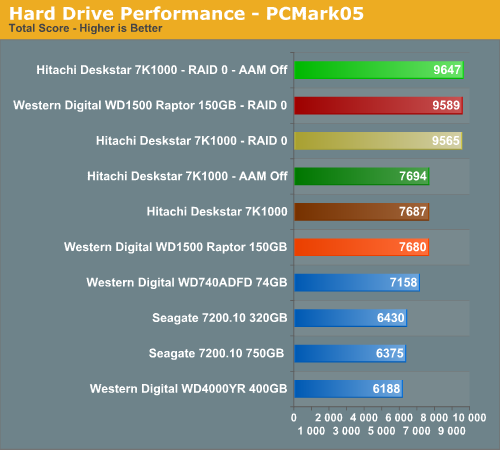
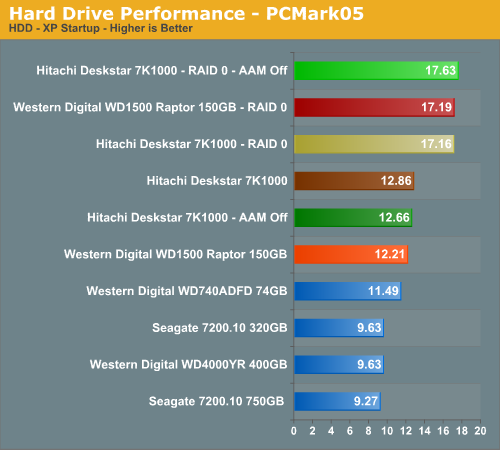
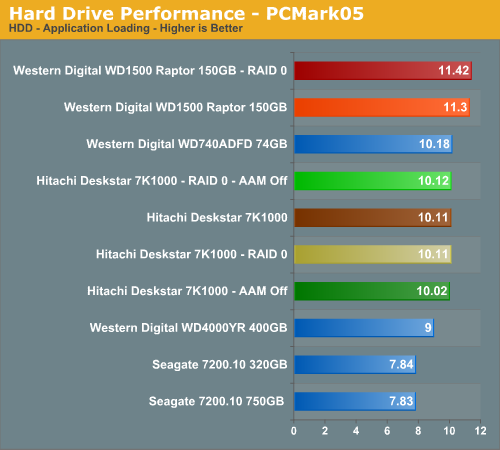
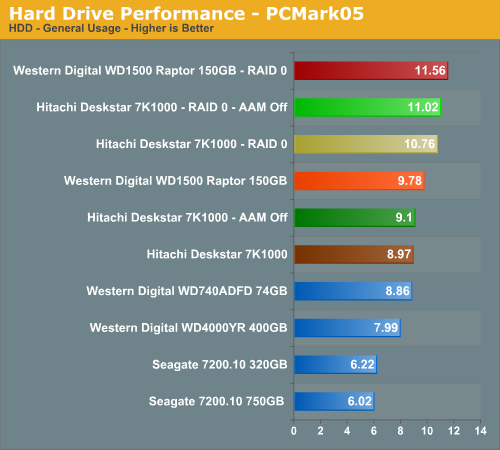
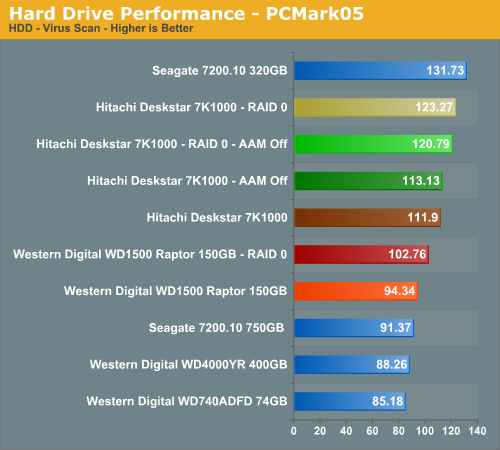
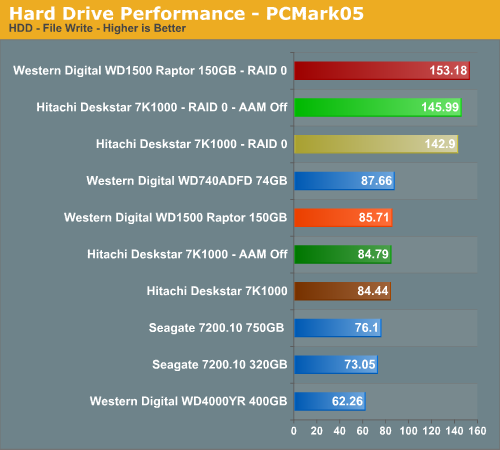
Our PCMark05 RAID 0 results show a 25% improvement over the single Hitachi drive results. The 7K1000 combination still scores better than the WD 150GB Raptor setup in this benchmark provided AAM is turned off, although the differences are minor. The major performance delta between the 7K1000 single and RAID 0 configuration is in the Windows Startup and File Write tests. As a side test that we are still developing, we tracked our actual XP startup times with each configuration. The RAID 0 setups only improved startup times by a few tenths of a second in most cases.
We fully expected the File Write tests to show major improvements as this is an area where RAID 0 will show an advantage. We see minor differences occurring in the General Usage and Application Loading sections of the test where write and read operations are balanced to a certain degree.
The Raptor's superior rotational/access speeds allow it to basically score slightly better than the 7K1000 except in the Virus Scan test where the 7K1000 has exceptional scores, even though it still lags behind the Seagate drive. Overall, if you need to improve your PCMark05 benchmark scores then RAID 0 will certainly do that, but as evidenced in the General Usage and Application results which mimic actual applications there is minimal impact.
We are utilizing the HDD test suite within PCMark05 for further comparative hard disk scores as it provides a mixture of actual application results and specific read/write percentages utilized within these programs. It is also a readily available benchmark that others can use for comparative purposes. The program utilizes the RankDisk application within the Intel iPeak SPT suite of tools to record a trace of disk activity during usage of real world applications. These traces are then replayed to generate performance measurements based upon the actual disk operations within each application. The HDD test suite contains 53% read and 47% write operations with each trace section utilizing varied amounts of read or write operations. Additional information about the test suite can be found in PDF format here PCMark05 whitepaper.
The PCMark05 test results are based upon the following trace runs:
Windows XP Startup: This test consists of 90% reading and 10% writes that tracks XP activities at start-up.
Application Loading: This test consists of 83% reading and 17% writes that tracks the opening and closing of the following programs.
- Microsoft Word
- Adobe Acrobat Reader
- Windows Media Player
- 3Dmark 2001SE
- Leadtek WinFast DVD
- Mozilla Internet Browser
- Opening a Microsoft Word document, performing grammar check, saving and closing
- Compression and decompression using WinZip
- Encrypting and decrypting a file using PowerCrypt
- Scanning files for viruses using F-Secure Antivirus
- Playing an MP3 file with Winamp
- Playing a WAV file with Winamp
- Playing a DivX video using the DivX codec and Windows Media Player
- Playing a WMV video file using Windows Media Player
- Viewing pictures using Windows Picture Viewer
- Browsing the Internet using Microsoft Internet Explorer
- Loading, playing and exiting a game with Tom Clancy's Ghost Recon
File Write: This test consists of 100% write activities by writing 680MB of files onto the hard disk.






Our PCMark05 RAID 0 results show a 25% improvement over the single Hitachi drive results. The 7K1000 combination still scores better than the WD 150GB Raptor setup in this benchmark provided AAM is turned off, although the differences are minor. The major performance delta between the 7K1000 single and RAID 0 configuration is in the Windows Startup and File Write tests. As a side test that we are still developing, we tracked our actual XP startup times with each configuration. The RAID 0 setups only improved startup times by a few tenths of a second in most cases.
We fully expected the File Write tests to show major improvements as this is an area where RAID 0 will show an advantage. We see minor differences occurring in the General Usage and Application Loading sections of the test where write and read operations are balanced to a certain degree.
The Raptor's superior rotational/access speeds allow it to basically score slightly better than the 7K1000 except in the Virus Scan test where the 7K1000 has exceptional scores, even though it still lags behind the Seagate drive. Overall, if you need to improve your PCMark05 benchmark scores then RAID 0 will certainly do that, but as evidenced in the General Usage and Application results which mimic actual applications there is minimal impact.










48 Comments
View All Comments
MadAd - Saturday, April 21, 2007 - link
<quote>Sorry but saving even 5 secs out of 10, 5 times a day is not work the extra money to me</quote>I take it you dont play battlefield 2 then. Having just two or three seconds advantage on each mapchange can mean the difference between a round flying a jet or helo, or a few seconds later watching everyone else fly off and being left with a humvee (if you are very lucky) or nothing at all.
Of course not all games have this problem however with bf2 when there are 32 players a side and only 2 jets each then its the quickest in that gets first picks, and if it takes running raid 0 just to pick up that extra second or two, then so be it.
ShadowdogKGB - Saturday, April 21, 2007 - link
My four little Hitachi 80gigs in R0 will load the single player Daging Oilfields in 18-20 seconds. Hows that for real world performance. Or maybe somebody from the church of the anti-raid can explain that away for me. My point of contention from this article is that the author went out of his way to denigrate the concept of raid. And another point is that you don't buy a 1 terabyte hard drives just to put them in raid, and especially put them in raid 0. These babies are for storage. You're definitely are not going to want 2 Terabytes of data sitting on a fragile Raid 0. No, this article is just plain skewed. Now there's gonna be a bunch of knuckle heads pointing to these benchmarks and saying "See? See? I told you so!" Yeah, HL2 Lost Coast. That's not even a real game. And The Sims2? Oh please. Yeah that's real world performance figures right there. Bleh. I'm no programmer or mathematician but I could have done a more decent article on this subject than this amateur.Axbattler - Friday, April 20, 2007 - link
I do not buy the 'extra money' argument that much (**). It's not like performance is the only (*possible) gain from striping two drives. The second drive get you extra capacity, and as long as people choosing to go RAID-0 are using the extra space, then they are not paying a financial premium over buying two drives and running them separately (unless they need to purchase a RAID controller). To me, the main cost from going RAID-0, is the added risk in case of failure.* Though I am in the school of thought that RAID-0, do not provide significant performance boost in the majority of the cases, I do find gains more often than penalties (from overhead).
Regarding from the article results, I am not surprised by the game loading results. I do, however suspect that the performance benefit of RAID-0 may be more noticeable in XP boot up time however (whether that is important enough, I'll shrug to it. Not my cash).
The file copy result make me wonder if there is not a bottleneck elsewhere though.
7.55 *1024 / 100 = 77.312 MB/sec on average. That's the transfer rate of a single drive.
** I do make an exception to people stripping Raptor's. I can't think of many desktop users who have enough 'performance sensive' applications (OS, apps, games - as opposed to multimedia files for instance) they use regularly - so much that they would need a second Raptor in the same rig. I do suspect that those users are really going for the bragging right rather than the 'free performance'.
Lastly, I wonder if RAM Disks, in their current form, are really faster the fastest SCSI drives at loading games. I seem to remember benchies of i-RAM some time ago showing it to edge the 150GB Raptor by not that much.
Griswold - Thursday, April 19, 2007 - link
Absolutely agree. The only winner is the storage industry.gramboh - Thursday, April 19, 2007 - link
No kidding, been waiting for the Seagate for a while. It will also be nice to see 250GB platters (x4) on a 1TB drive. I'm running 2x 7200.10 500's right now and am happy with them. I'd like 1TB to come out to push drive costs down so I use a few for external back-up.BoberFett - Thursday, April 19, 2007 - link
Anybody who stripes drives of this size is asking to lose a lifetime's worth of data. Even assuming it's data than can be reassembled such as ripped or downloaded music and movies, the time required to reassemble that data is pretty significant.goinginstyle - Thursday, April 19, 2007 - link
Glad to see you guys still telling it like it is with RAID 0. I am just waiting on the comments to come in from people who swear it lets them operate their systems at light speed. This drive seems to be really nice but I will wait for the Seagate 1TB to come out before making an upgrade decision. When is it coming out?Gary Key - Thursday, April 19, 2007 - link
The Seagate 1TB drives are due out in four to six weeks according to the last information we had from them.